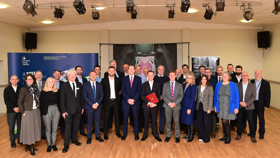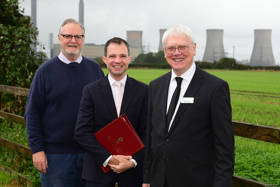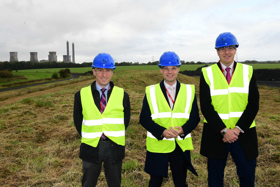


Minister for Nuclear and Networks announces the CEO of UK Industrial Fusion Solutions, the delivery body of the STEP (Spherical Tokamak for Energy Production) prototype fusion energy plant at West Burton, near Retford.
STEP will aim to demonstrate net positive electricity from fusion energy in the 2040s, stimulating the commercialisation of a transformational new energy source
Minister for Nuclear and Networks, Andrew Bowie MP, has announced the appointment of Paul Methven as the inaugural CEO of UK Industrial Fusion Solutions (UKIFS) responsible for the delivery of STEP – a prototype fusion energy plant to be built at West Burton.
STEP will be led by UKIFS, a wholly owned subsidiary of the UK Atomic Energy Authority (UKAEA), with Professor Sir Ian Chapman remaining as the Group CEO.
The STEP programme aims to pave the way for the commercialisation of fusion energy and the potential development of a fleet of future fusion powerplants around the world, ensuring the UK remains at the forefront of a new technology and emerging industry.
Minister Bowie made the announcement during his first visit to STEP’s future home in West Burton where he also emphasised the wider benefits the programme will bring to the region.
Minister for Nuclear and Networks, Andrew Bowie, said: “The STEP programme is at the heart of our Fusion Strategy – key to making the potential of new fusion energy a commercial reality, and to drive economic growth.
“Paul Methven will bring a wealth of experience to the programme, working to deliver a prototype fusion plant in the 2040s and to cement the UK’s place at the forefront of developing this cutting-edge technology."
Professor Sir Ian Chapman, Group CEO of UKAEA, said: “STEP has the potential to be a revolutionary programme, but it is highly complex and involves great uncertainties. It needs a brilliant CEO who can manage such complex engineering programmes and grow and unite a national endeavour to deliver fusion.
“I’m delighted that, in Paul Methven, we have secured exactly that – a brilliant leader with a track record of working in complex major programmes that matter to the country and leading diverse teams in public-private partnerships. I am excited to work with Paul and his team to deliver STEP and make fusion power a reality.”
Paul joined the STEP programme in September 2020 from the Ministry of Defence, where he was Director of Submarine Acquisition at the Submarine Delivery Agency. In this role he was Programme Director for Dreadnought, the UK’s second largest major programme after HS2, and has previously led a number of other major and complex programmes across the MoD.
Professor David Gann CBE, Chair of UKIFS, said: “The appointment of the inaugural CEO for UKIFS marks an important milestone as we strive to generate electricity from fusion, which will provide a huge economic opportunity for the UK.
“I look forward to working closely with Paul and the STEP team to ensure the programme stimulates a vibrant industrial base alongside the development of future fusion skills and the global deployment of fusion energy.”
Councillor Keith Girling, the county council’s Cabinet Member for Economic Development and Asset Management, described the wider benefits the project will bring to Nottinghamshire. He said,
“STEP will bring incredible benefits to the county and wider region, including millions, if not billions worth of investment, putting it at the heart of the government’s plans to revolutionise the way we generate energy in the UK.
“The site will be the international hub for carbon-neutral, fusion development, attracting the brightest minds locally and from across the world, creating thousands of highly skilled jobs.”
Fusion has potential to deliver safe, sustainable, low carbon energy for generations to come. It is based on the same processes that power the sun and stars.
When a mix of two forms of hydrogen are heated to extreme temperatures – 10 times hotter than the core of the sun – they fuse together to create helium and release huge amounts of energy.
Fusion energy has the potential to provide ‘baseload’ power, complementing renewable and other low carbon energy sources as a share of many countries’ energy portfolios Achieving this involves working at the forefront of science, engineering, and technology.
